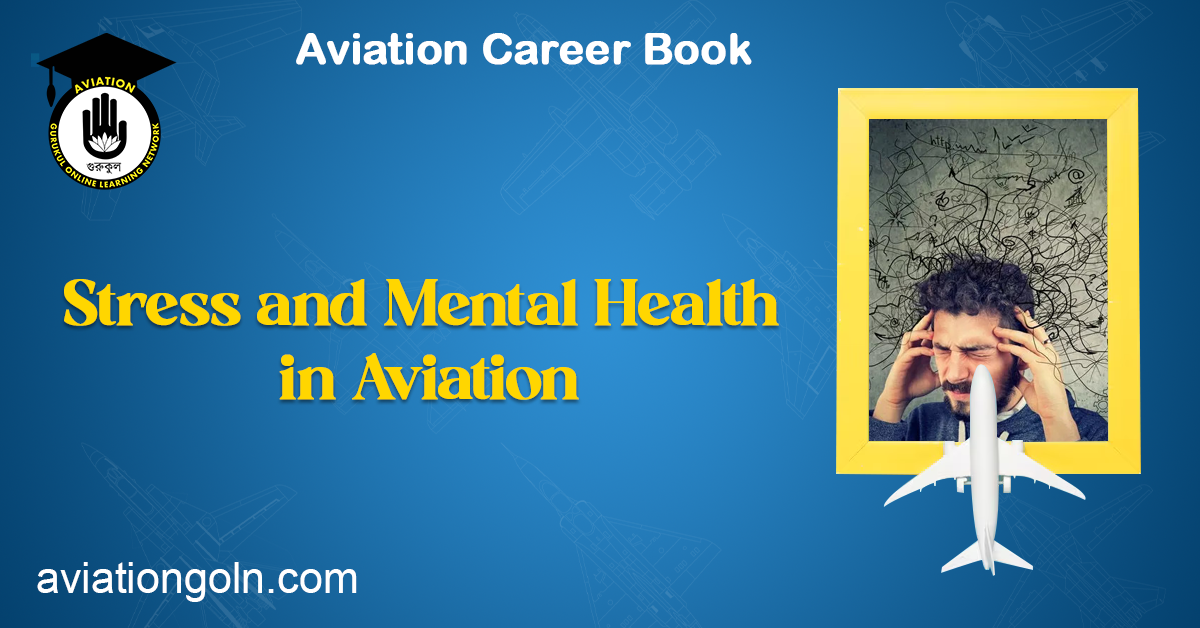Stress and Mental Health in Aviation: The aviation sector, renowned for its glitz and glamour, is also notorious for the stress and mental health challenges that professionals in this field face. From pilots and cabin crew to air traffic controllers and maintenance personnel, stress is an underlying factor that can profoundly impact performance, safety, and personal well-being. This article delves deep into the sources of stress in aviation, the implications for mental health, and actionable strategies to survive and thrive in an aviation career.
Stress and Mental Health in Aviation

I. Sources of Stress in Aviation
1. Irregular Schedules: Aviation professionals often grapple with erratic schedules, which can disrupt their circadian rhythms and lead to chronic fatigue.
2. Physical Demands: Long hours, changing time zones, and the physical strain of flying or managing aircraft can take a toll on the body, leading to stress.
3. Emotional and Mental Challenges: Dealing with disgruntled passengers, managing emergencies, and ensuring the safety of hundreds of lives can be emotionally taxing.
4. Regulatory Pressures: Aviation is heavily regulated, and the pressure to comply with numerous regulations and undergo regular assessments adds another layer of stress.
5. Personal Life Strains: Maintaining relationships and family ties becomes challenging given the unpredictable nature of the job, leading to personal and familial stress.

II. Implications for Mental Health
1. Sleep Disorders: The irregularity of shifts can lead to conditions like insomnia and chronic fatigue syndrome.
2. Burnout: Repeated exposure to high levels of stress without adequate recovery can lead to burnout, characterized by emotional exhaustion, cynicism, and reduced efficacy.
3. Depression and Anxiety: Persistent stress can result in anxiety disorders and depression. The responsibility of ensuring passenger safety, combined with personal stressors, can be overwhelming.

4. Substance Abuse: Some aviation professionals might resort to alcohol or drugs as coping mechanisms, leading to addiction and further mental health issues.
5. Cognitive Impairments: Chronic stress can affect cognitive functions, impacting decision-making, attention, and memory – crucial attributes in the aviation world.

III. Proactive Steps Towards Mental Wellness
1. Recognize the Signs: Self-awareness is the first step. Recognizing signs of fatigue, irritability, mood swings, or a drop in performance can help in seeking early interventions.
2. Seek Professional Help: Therapists, psychologists, or counselors trained in aviation psychology can provide specialized guidance and coping strategies.
3. Peer Support: Talking to colleagues, joining support groups, or participating in forums can provide a sense of community and understanding.
4. Physical Health: A balanced diet, regular exercise, and adequate sleep can play a pivotal role in managing stress and ensuring mental well-being.
5. Meditation and Mindfulness: Practices like yoga, meditation, and deep breathing exercises can help in grounding oneself and managing anxiety.

IV. Institutional Role in Supporting Mental Health
1. Comprehensive Training: Beyond technical skills, training programs should incorporate modules on stress management, communication, and mental health awareness.
2. Regular Health Checks: Instituting mandatory and frequent psychological evaluations can help in early detection of mental health issues.
3. Creating a Supportive Environment: Encouraging open communication, creating avenues for seeking help without stigma, and offering mental health resources can create a more supportive work environment.
4. Stress Management Workshops: Regular workshops focusing on stress management techniques can equip employees with tools to handle their unique challenges.
5. Rethinking Scheduling: While operational demands are paramount, reevaluating and restructuring scheduling to ensure adequate rest can help in reducing chronic fatigue.

V. Resilience Building: Key to Thriving in Aviation
1. Mental Preparation: Visualizing challenges and mentally preparing for them can reduce anxiety and improve performance during real-life situations.
2. Continuous Learning: Embracing a learning mindset, where mistakes are viewed as opportunities for growth, can reduce performance-related stress.
3. Work-Life Balance: Ensuring quality downtime, spending time with loved ones, and pursuing hobbies can act as a buffer against work-related stress.
4. Flexibility and Adaptability: Embracing change, being flexible, and adapting to new situations can reduce resistance and the associated stress.
5. Seeking Feedback: Regular feedback from peers and superiors can provide clarity, reduce uncertainties, and help in personal and professional growth.

Stress and mental health challenges in aviation, while inevitable, are not insurmountable. With the right strategies, both at an individual and institutional level, one can navigate these challenges effectively. Recognizing the signs, seeking help, building resilience, and leveraging institutional support are crucial in ensuring that aviation professionals not only survive but thrive in their careers.
In the end, while the skies might present turbulence, with the right preparation and mindset, one can ensure a smooth journey. The narrative around mental health in aviation needs to shift from mere survival to thriving, and with concerted efforts, the industry can ensure the well-being of its most valuable asset – its people.
